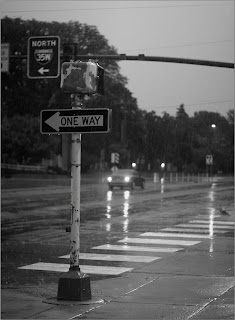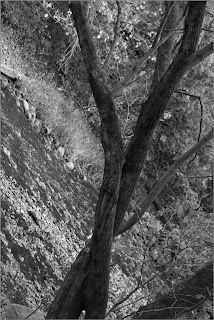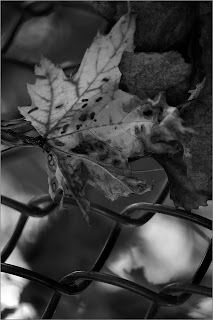Jerome Berglund
Early in college I made a short film.
The plot
was meant to be loosely adapted from the song Tin Soldier, and I cast a heavily tattooed veteran (Figure 1) to play the lead. In the story, he surprised an apartment full
of college students and swiftly murdered the lot of them. Then he went about searching their residence,
at first cool and businesslike, but then with progressive agitation and
unease.
He was
seeking something there, and had difficulty finding it. Ultimately he located the mysterious item he
had been rummaging for, but like the lyrics to the tune, found it wanting,
raising more questions than it in fact answered.
The charm
in question he discovered lodged within a balloon, inside the stomach of one of
the unlucky tenants, whom he’d recently unceremoniously dealt with so
cruelly.
He dredged
it out from her intestines, a scene I simulated with genuine pig guts—which had been purchased from a Farmer’s
Market, in an upscale Beverly Hills mall.
I could as easily have staged the sequence with pasta noodles, I
realized later, as they look virtually identical.
The
enthusiastic lead and his female co-star—a
spunky drama major, whose graphic disembowelment might well have been the most
valuable footage a cumulative two hundred grand in tuition expenditures
afforded her, stiff and corpsy if she was for most of the entirety, excluding
the brief but colorful initial strangulation—were both tremendously good
sports about getting their hands and chests dirty, rooting about through, being
smeared in authentic hog gore.
But in the
end, the video—shot on cameras our
program provided, inexplicably the lowest quality digital handi-cams on the
market, perhaps to be sure our masterworks were entirely unusable to us as
‘auteur’ calling cards, prohibited from sharing them outside the school in any
capacity as we were, retaining copyright upon all of it our alma mater
continues to; the same models David Lynch, in characteristically rebellious
fashion, elected to shoot Inland Empire on—terminated with the soldier
unwrapping the balloon and finding, not smuggled diamonds, or heroin, or a
thumb drive with launch codes, or anything so exciting as that, but rather a scrap
of paper (Figure 2) with the words
‘Peace on Earth’ scrawled upon it.[1]
Derivative? Surely.
Still,
that actor had seen something not dissimilar (Figure
3) to this ballad and its adaptation, over the course of his tour in the
Middle East. And in the years to come (Figure 4) we would both find ourselves
wallowing through further days of judgment, mornings of bloodshed, before the
hateful neighbors and cheating friends (Figure
5) were done with us. (Figure 6)
You don’t
need to travel (Figure 7) up any
hill to become mired in struggle, get ambushed (Figure
8) for those few treasures you have buried. Just lean out the nearest window (Figure 9) and listen: the trumpets are
distinct, unmistakable.
We both
later served some time,[2] (Figure 10) in jails, and out of them,
before finding our ways back to El Paso and Minneapolis respectively. I hope those other bit players each also made
it out in one piece, (Figure 11) held
together by chewing gum, baling wire, or twine as needed to be.
Better for
tin soldiers to have ridden away, (Figure
12) I always say.
In
situational awareness training years later, I would learn about the importance
of running the other direction from gunfire, rather than towards it. They should teach people that earlier in life.
(Photography courtesy of Jerome Berglund. Click on images to see in high resolution)
 |
| Figure 1. “Darkman”. |
 |
| Figure 2. “Fell Down On My Knees”. |
 |
| Figure 3. “Tempest”. |
 |
| Figure 4. “One Way”. |
 |
| Figure 5. “Waltzing”. |
 |
| Figure 6. “Reaping Time”. |
 |
| Figure 7. “Migration”. |
 |
| Figure 8. “Deciduous”. |
 |
| Figure 9. “Madrigals”. |
 |
| Figure 10. “No Country”. |
 |
| Figure 11. “Hit and Run”. |
 |
| Figure 12. “Desert Rose”. |
[2] A ‘bit’ you would call it, in the convict vernacular. Interesting that’s the same word used to describe a stand-up routine in comedy.
Bio: Jerome Berglund is an author and fine artist who cowrote a television pilot which at a festival for them received numerous accolades including best in show. He graduated summa cum laude from the University of Southern California’s Cinema-Television Production program, with emphases in screenwriting and philosophy. Berglund is author to the novel Havenauts and the story collection Dick Jokes. His short fiction has been exhibited by the Watershed Review, Paragon Press, and the Stardust Review. His poetry appears in Abstract Magazine, Bangalore Review, Barstow & Grand, and most recently O:JA&L. A drama he penned was published in Iris Literary Journal. Berglund is furthermore an established, award-winning fine art photographer, whose black and white pictures have been exhibited in galleries across New York, Minneapolis, and Santa Monica. In another life he worked as a visual effects artist for Lucasfilm and Dreamworks, and assisted on set at Lifetime and Comedy Central. He has the unique privilege of being able to say he was once Minnie Driver’s driver. Berglund is a committed activist as well, and has been actively involved in the Occupy, Standing Rock, and Black Lives Matter movements, and supported grassroots efforts promoting the Green Party.

No comments :
Post a Comment
We welcome your comments related to the article and the topic being discussed. We expect the comments to be courteous, and respectful of the author and other commenters. Setu reserves the right to moderate, remove or reject comments that contain foul language, insult, hatred, personal information or indicate bad intention. The views expressed in comments reflect those of the commenter, not the official views of the Setu editorial board. प्रकाशित रचना से सम्बंधित शालीन सम्वाद का स्वागत है।